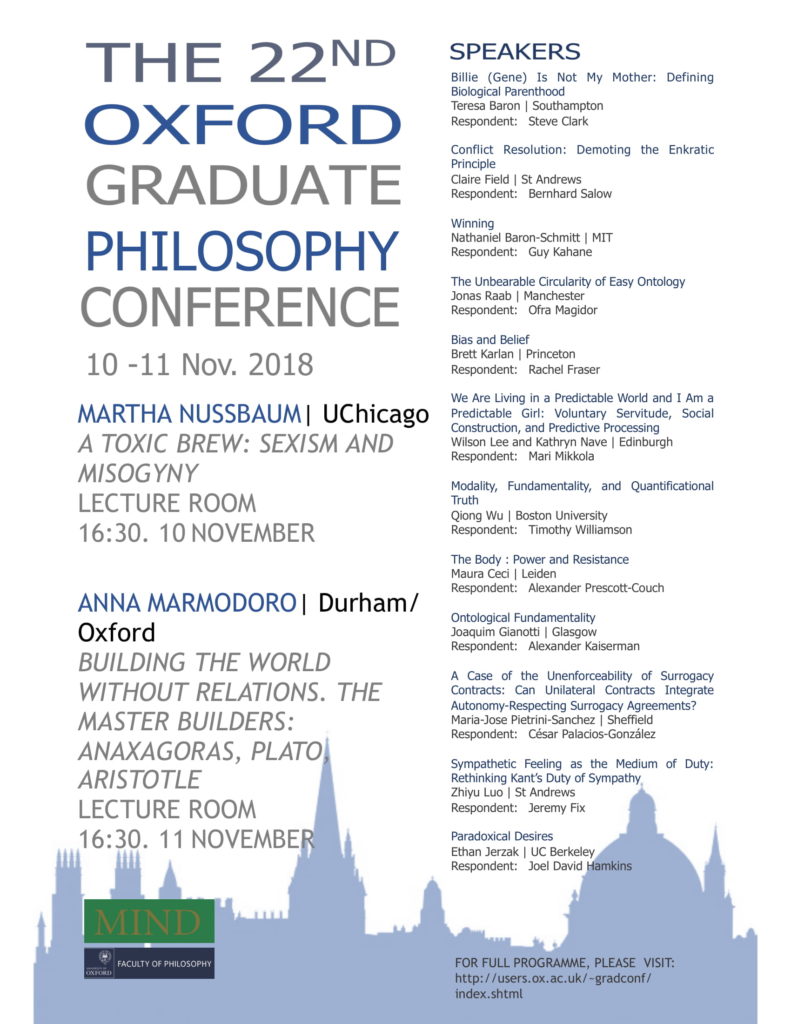Infinity
Philosophy 20607 01 (32582)
University of Notre Dame Spring 2023

Instructor: Joel David Hamkins, O’Hara Professor of Philosophy and Mathematics
3:30-4:45 Tuesdays + Thursdays, DeBartolo Hall 208
Course Description. This course will be a mathematical and philosophical exploration of infinity, covering a wide selection of topics illustrating this rich, fascinating concept—the mathematics and philosophy of the infinite.
Along the way, we shall find paradox and fun—and all my favorite elementary logic conundrums and puzzles. It will be part of my intention to reveal what I can of the quirky side of mathematics and logic in its connection with infinity, but with a keen eye open for when issues happen to engage with philosophically deeper foundational matters.
The lectures will be based on the chapters of my forthcoming book, The Book of Infinity, currently in preparation, and currently being serialized and made available on the Substack website as I explain below.
Topics. Among the topics we shall aim to discuss will be:
- The Book of Numbers
- Zeno’s paradox
- The infinite coastline paradox
- Supertasks
- Largest number contest
- The googol plex chitty bang stack hierarchy
- Galileo’s Salviati on infinity
- Hilbert’s Grand Hotel
- The uncountable
- How to count (to infinity and beyond!)
- Slaying the Hydra
- Transfinite recursion
- The continuum hypothesis
- The axiom of choice
- Orders of infinity
- The lattice of subsets of ℕ
- Potential versus actual infinity
- Confounding puzzles of infinity
- Infinite liars
- Infinite utilitarianism
- Infinite computation
- Infinite games
- Indescribable numbers
- Extremely remote events of enormous consequence
- The sand reckoner
- Paradox in high dimension
- The outer limits of reason
- Puzzles of epistemic logic and the problem of common knowledge
Mathematical background. The course will at times involve topics and concepts of a fundamentally mathematical nature, but no particular mathematical background or training will be assumed. Nevertheless, it is expected that students be open to mathematical thinking and ideas, and furthermore it is a core aim of the course to help develop the student’s mastery over various mathematical concepts connected with infinity.
Readings. The lectures will be based on readings from the topic list above that will be made available on my Substack web page, Infinitely More. Readings for the topic list above will be gradually released there during the semester. Each reading will consist of a chapter essay my book-in-progress, The Book of Infinity, which is being serialized on the Substack site specifically for this course. In some weeks, there will be supplemental readings from other sources.
Student access. I will issue subscription invitations to the Substack site for all registered ND students using their ND email, with free access to the site during the semester, so that students can freely access the readings. Students are free to manage their subscriptions however they see fit. Please inform me of any access issues. There are some excellent free Substack apps available for Apple iOS and Android for reading Substack content on a phone or other device.
Discussion forum. Students are welcome to participate in the discussion forums provided with the readings to discuss the topics, the questions, to post answer ideas, or engage in the discussion there. I shall try to participate myself by posting comments or hints.
Homework essays. Students are expected to engage fully with every topic covered in the class. Every chapter concludes with several Questions for Further Thought, with which the students should engage. It will be expected that students complete approximately half of the Questions for Further thought. Each question that is answered should be answered essay-style with a mini-essay of about half a page or more.
Extended essays. A student may choose at any time to answer one of the Questions for Further Thought more fully with a more extended essay of two or three pages, and in this case, other questions on that particular topic need not be engaged. Every student should plan to exercise this option at least twice during the semester.
Final exam. There will be a final exam consisting of questions similar to those in the Questions for Further Thought, covering every topic that was covered in the course. The final grade will be based on the final exam and on the submitted homework solutions.
Open Invitation. Students outside of Notre Dame are welcome to follow along with the Infinity course, readings, and online discussion. Simply subscribe at Infinitely More, keep up with the readings and participate in the discussions we shall be having in the forums there.



